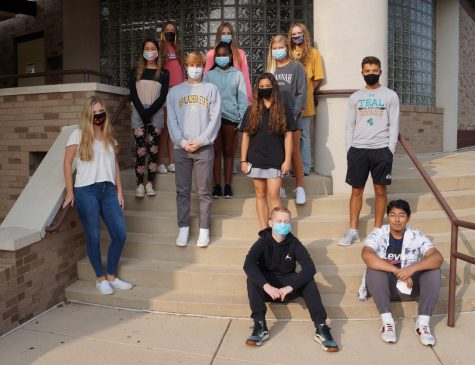Social media distracts students, builds social skills
It’s 9:30 p.m. and I have just started writing my government essay, which is due tomorrow. I’ve been putting it off all night. First I chatted with a friend on Facebook for about an hour while checking Twitter and watching a movie on Netflix. Then I continued to check Facebook and Twitter throughout the night while also watching new videos that have been posted by people I’m subscribed to on YouTube. Now I’m finally going to start it, but first I just want to check Facebook and Twitter one more time.
Procrastination on social networking sites and apps plagues high school students. According to a study done by the Pew Research Center, one out of every three people checks Facebook multiple times a day. StatisticBrain.com states that 22 percent of teenagers check Facebook more than 10 times a day.
In junior Alex Gromacki’s opinion, social networking sites help her and other students to procrastinate. “I think [students] would procrastinate anyway so going on social networking sites only helps them to procrastinate longer,” Gromacki said.
I used Twitter to contact Gromacki for her opinion. “[Social networking sites] are very distracting. Like right now, I should be doing homework instead of going on Twitter,” Gromacki said in reply to my tweet.
According to an academic journal by Paul Kirschner and Aryn Karpinski, “Students who reported academic problems were more likely to use the Internet for real-time social activities such as IM and chat rooms.”
However, some studies have shown that social networking and the Internet can help students in school. In Portland, OR, grades went up by 50 percent after an engaging social media program for students was introduced at George Middle School. The introduction of this program also led to a decline in chronic absenteeism by 33 percent and an increase in students who were completing voluntary extra-credit assignments.
Social networking sites can also help students break out of their shells. According to a study done by CommonSenseMedia.org, over 25 percent of teenagers said that social networking helps them to feel less shy and more confident. The magazine, Jewish action, stated that students who are usually quiet can feel “more comfortable being vocal through a social media platform used in class.”
According to psychology teacher Dr. Paul Lazor, social networking sites are not the main problem. “I think anything that distracts you in class or at home will interfere with academic performance. The less time you spend studying, the less well you will do. It’s common sense,” Lazor said.
Although it is harder to access popular social networking sites such as Facebook and Twitter in school, students can still become distracted by the Internet. It is common for students to check emails and bask in online shopping while listening and taking notes in class. In a survey that was sent to students on Jan. 18, 46 percent of the 124 students who responded, said that they use social networking sites and applications in school. About 80 percent of these students said that social networking sites and applications have not made a noticeable difference on their grades. However, 65 percent of these students reported that social networking sites and applications have distracted them from homework or caused them to procrastinate on homework.
According to a study referenced in Kirschner’s and Karpinski’s article, it has been shown that multitasking instead of performing one task at a time “leads to poorer learning results in students and poorer performance of tasks.” Kirschner and Karpinski go on to say that this is because of “the fact that switching [tasks] requires a person to juggle her or his limited cognitive resources to accomplish the different tasks successfully. This juggling leads to greater inefficiency in performing each individual task, namely that more mistakes are made, and it takes significantly longer as compared to sequential work.”
Lazor agrees with Kirschner’s and Karpinski’s claims. “I think it is accurate that there is no such thing as effective multitasking. It’s very hard to buy your prom dress or look at prom dresses and absorb anything that’s going on in class at the same time. It’s just like how you can’t really text and drive or even talk on the phone and drive effectively at the same time.”
Mary Kate Luft is an A&E Editor for The Patriot and jcpatriot.com.










